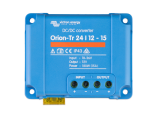What is the difference between a DC-DC Converter & Charger8 September 2022 | Paul Today we quickly explain the differences between a DC-DC Charger and a DC-DC Converter & help you make sure that you pick the right one for your needs. Both work in similar ways by taking a DC voltage and changing it, however, how they change it and the applications they're used for are very different. DC-DC Charger A DC-DC Charger is a sophisticated, multi-stage charging solution that can provide a charging voltage that will vary based on your battery's requirement. A DC-DC Charger will sit between your starter battery and leisure battery and will take power from your alternator to charge your leisure battery whilst the engine is running. These chargers can be programmed to charge various battery types and are often highly configurable. Think of them as a mains battery charger, but they're powered by a DC source instead of an AC source. DC-DC Converter A DC-DC Converter will take a DC voltage on its input and modify it to produce a higher or lower DC voltage on its output, for example, 24V to 12V. The created voltage is stable and does not change, meaning it is not suitable for charging but ideal for running DC-powered equipment. These units will normally take their power from a leisure battery (or bank of batteries) and then send the output power direct to a load (ie: fridge, lights etc). These converters are typically used where you have a 24V leisure battery bank, but wish to power 12V appliances (which are much more common than 24V-powered appliances). The output voltage of some DC-DC Converters can be adjusted within a range, so could theoretically be used to provide a 'float' charging voltage to maintain a battery, but we'd still recommend a dedicated charger rather than a converter.
So for charging you need a DC-DC charger and to run equipment a DC-DC converter would be best. We hope you have found this helpful but if you have any further questions then please let us know.
|
| |||||||||||||||||||||||||||||||||||
12 Volt PlanetAuto & Marine Electrical Components |





.png)








